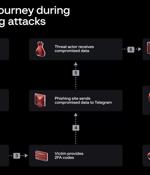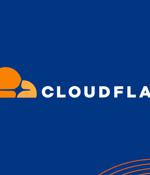Security News

Group-IB has discovered that the recently disclosed phishing attacks on the employees of Twilio and Cloudflare were part of the massive phishing campaign that resulted in 9,931 accounts of over 130 organizations being compromised. Group-IB Threat Intelligence team uncovered and analyzed the attackers' phishing infrastructure, including phishing domains, the phishing kit as well as the Telegram channel controlled by the threat actors to drop compromised information.

The threat actor behind the attacks on Twilio and Cloudflare earlier this month has been linked to a broader phishing campaign aimed at 136 organizations that resulted in a cumulative compromise of 9,931 accounts. The activity has been condemned 0ktapus by Group-IB because the initial goal of the attacks was to "Obtain Okta identity credentials and two-factor authentication codes from users of the targeted organizations."

WordPress sites are being hacked to display fake Cloudflare DDoS protection pages to distribute malware that installs the NetSupport RAT and the RaccoonStealer password-stealing Trojan.DDoS protection screens are commonplace on the internet, protecting sites from bots that ping them with bogus requests, aiming to overwhelm them with garbage traffic.

Web infrastructure company Cloudflare on Tuesday disclosed at least 76 employees and their family members received text messages on their personal and work phones bearing similar characteristics as that of the sophisticated phishing attack against Twilio. The attack, which transpired around the same time Twilio was targeted, came from four phone numbers associated with T-Mobile-issued SIM cards amd was ultimately unsuccessful.

Cloudflare says it was subject to a similar attack to one made on comms company Twilio last week, but in this case it was thwarted by hardware security keys that are required to access applications and services. According to Cloudflare, it recorded a very similar incident late last month, which could suggest the two attacks may have originated from the same attacker or group.

Cloudflare says some of its employees' credentials were also stolen in an SMS phishing attack similar to the one that led to Twilio's network being breached last week. Although the attackers got their hands on Cloudflare employees' accounts, they failed to breach its systems after their attempts to log in using them were blocked since they didn't have access to their victims' company-issued FIDO2-compliant security keys.

A Danish ethical hacker was able to work his way uninvited into a closed Cloudflare beta and found a vulnerability that could have been exploited by a cybercriminal to hijack and steal someone else's email. Student Albert Pedersen reported the critical vulnerability to Cloudflare via the company's bug bounty program, and was awarded $3,000.

The botnet behind the largest HTTPS distributed denial-of-service attack in June 2022 has been linked to a spate of attacks aimed at nearly 1,000 Cloudflare customers. Calling the powerful botnet Mantis, the web performance and security company attributed it to more than 3,000 HTTP DDoS attacks against its users.

Cloudflare says a massive outage that affected more than a dozen of its data centers and hundreds of major online platforms and services today was caused by a change that should have increased network resilience."Today, June 21, 2022, Cloudflare suffered an outage that affected traffic in 19 of our data centers," Cloudflare said after investigating the incident.

Cloudflare said it this month staved off another record-breaking HTTPS-based distributed denial-of-service attack, this one significantly larger than the previous largest DDoS attack that occurred only two months ago. In April, the biz said it mitigated an HTTPS DDoS attack that reached a peak of 15.3 million requests-per-second.